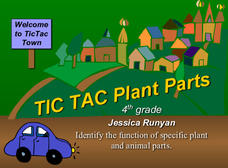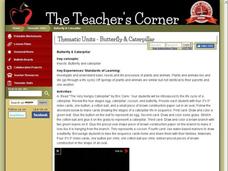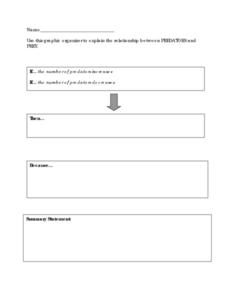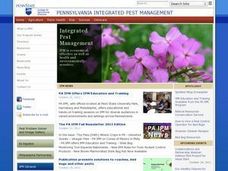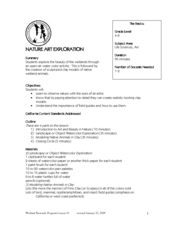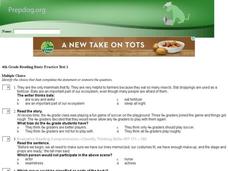Curated OER
Tic Tac Plant Parts
This plant biology PowerPoint introduces plant parts and their functions. This PowerPoint allows students to identify each plant part on a diagram, along with its' function. The slides contain a clear explanation of how each plant part...
Curated OER
What's Wild
Third graders discover the differences between wild and domestic animals. In this animal lesson, 3rd graders chart the differences in the animals and look through magazines for pictures of wild and domestic animals to glue to a poster....
Indian Land Tenure Foundation
Relationships to Places
Young historians take a look at how the Indian tribes of California promoted a mindful relationship between people and the land. They begin to understand how the Indians were champions of conservation, and at preserving the natural...
Curated OER
Classifying Living and Non-Living Objects
Students investigate living organisms and define the properties of a living species. In this life characteristic lesson plan, students examine plants in their class and discuss whether or not they are alive. Students create a living...
Curated OER
The Life Cycle of the Butterfly
Second graders study the life cycle of a butterfly by observing metamorphosis taking place in a butterfly pavilion. Students illustrate their understandings of the body parts of a caterpillar and butterfly, as well as the life cycle,...
Curated OER
Butterfly and Caterpillar
Learners listen to the story "The Very Hungry Caterpillar" and create their own "Very Hungry Caterpillar" book to learn the life cycle of a butterfly.
Curated OER
Logic and Problem Solving: Math Hunt
In these math lesson plans, students discuss how math problems are written to reflect real-world situations. They complete an online Math Hunt using specific web tools, and work individually to create their own Math Hunts. Additionally,...
Curated OER
Arthropods at Home: Spider, Isopod, or any Arthropod
Second graders observe, discuss, and record the requirements of a healthy environment for both arthropods and people by designing and maintaining an artificial habitat for an arthropod, and considering the requirements for a healthy body...
Curated OER
Animal Signs
Students discuss the many different types of animal signs that can be used to identify and track animals. They participate in an hands-on activity in which they examine tracks, trails, homes, territory markings, and even "scat" left by...
Curated OER
Flower Dissection
Students dissect three different flowers and compare and contrast them. In this flowers lesson plan, students learn about the flower anatomy and then dissect their own flowers.
Curated OER
A Guinea Pig Makes An Excellent Classroom Pet
Third graders live alongside guinea pigs. In this biology lesson plan, 3rd graders gain direct knowledge of the guinea pig's behavior and determine if it will make a good classroom pet.
Curated OER
Pets - Stuffed Animal Day
Students listen to Courtney Baker's, "The Perfect Pet," on a day they bring a stuffed animal to school. They graph the types of stuffed animals that their classmates brought to school before answering questions based on the graph. Next,...
Curated OER
Habitat Lap Sit
Fourth graders physically form a circle that shows the interconnectedness of the components of a habitat. They form circles and role play the parts of habitats.
Curated OER
The Very Clumsy Click Beetle
Second graders determine what it means to be clumsy before listening to Eric Carle's, The Very Clumsy Click Beetle. They examine the part where the click beetle does flips before drawing three frames that show the beetle flipping. For...
Curated OER
Predators and Prey
Students explain how the food chain works. They contrast predators with prey and describe their function in nature. Students discuss how the food chain aids in keeping nature balanced. In small groups, they play a game that simulates the...
Curated OER
Tree Friends
Students are introduced to tree structure and use. They identify their special tree using all senses except sight. Students identify six different internal parts within a cross section of tree trunk (bark, phloem, xylem, cambium,...
Curated OER
Aquatic Food Webs
Students discuss producers, herbivores, omnivores, carnivores, and decomposers and analyze the difference between food chains and food webs. They participate in a food web yarn game, examining what can effect the breakdown of the web.
Curated OER
Wacky Water Critters
Students visit a local creek or stream. They collect water samples from the creek and observe and sort the "water critters" they find in the sample, observing smaller organisms under a microscope if necessary. They identify each organism...
Curated OER
What Makes up an Ecosystem?
Eighth graders design posters of working ecosystems using pictures from magazines. They label autotrophic, heterotropic, or saprotrophic energy sources, and identify predators and prey.
Curated OER
Bats -- Pests or Pals?
Fourth graders examine a bat and determine if it is a pest or pal. They identify three types of bats native to the state of Pennsylvania. They also identify the parts of a bat and write a report on the bat of their choice.
Curated OER
Discovering Owls
Students are introduced to different types of owls and owl pellets. They list several adaptations that benefit the owls. Students identify the various species of owl that live in Wisconsin. Students discuss owl pellets and identify the...
Curated OER
Predator/Prey
Young scholars explain how the food chain works. They contrast predators with prey and describe their function in nature. Students discuss how the food chain aids in keeping nature balanced. They play a game that simulates the food...
Curated OER
Nature Art Exploration
Students draw a nature landscape using watercolors. In this life science lesson, students share their personal experience on the beauty of nature. They create clay models of different native animals.
Curated OER
Evaluative Reading Comprehension
For this reading worksheet, students answer multiple choice questions about reading lists, classifying, grouping sentences, and more. Students complete 20 problems.


